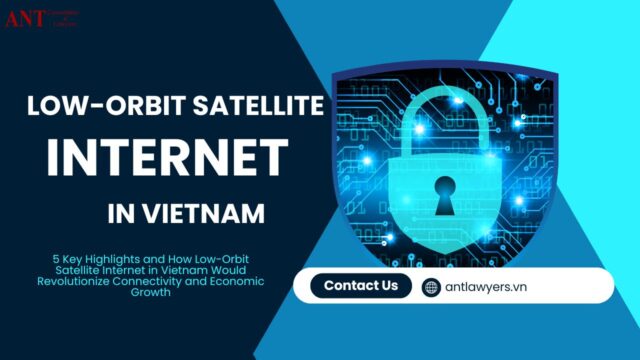The Pilot Policy of Low-Orbit Satellite Internet in Vietnam
Now, Vietnam has moved its position, adjusted its policy to foster closer ties with foreign investors, aligning its digitalization strategy with broader economic cooperation and investment opportunities.
Vietnam is entering a new era of digital connectivity with the recent approval of a pilot policy allowing foreign and domestic investments in low-orbit satellite Internet in Vietnam or low-earth orbit satellite Internet (LEO).
This initiative, backed by the Vietnamese National Assembly, aims to expand high-speed internet coverage nationwide, particularly in rural and underserved areas where traditional fiber-optic infrastructure is challenging to deploy.
With global satellite internet providers eyeing Vietnam’s market, the country is set to transform its telecommunications sector, attract foreign investment, and enhance national digital infrastructure.
However, this move also comes with legal, regulatory, and cybersecurity challenges that must be addressed.
In this article, we explore the Vietnam’s low-orbit satellite Internet policy, examining its impact on the economy, technology, and society.
What is The New Policy and Its Implications for Vietnam’s Telecom Sector?
Vietnam’s low-orbit satellite Internet pilot policy, approved in February 2025, is a game-changing decision aimed at modernizing the nation’s digital infrastructure.
The key 5 highlights of this policy include:
- Opening the market for satellite-based internet services, allowing 100% foreign investment in pilot projects.
- Granting operating licenses to selected low-orbit satellite Internet providers under strict government oversight.
- Mandating local data processing, ensuring compliance with Vietnam’s cybersecurity laws.
- Expanding internet access to remote areas, bridging the country’s digital divide.
- Encouraging competition, driving innovation, and enhancing service affordability.
This regulatory shift aligns with Vietnam’s broader digital transformation strategy, which aims to achieve universal internet access by 2030.
Who are The Key Players and Stakeholders Involved?
The successful implementation of low-orbit satellite Internet in Vietnam involves multiple stakeholders, including:
Government Agencies:
Ministry of Information and Communications (MIC): Oversees the licensing, regulation, and cybersecurity compliance of satellite internet providers.
Vietnam Telecommunications Authority (VNTA): Manages spectrum allocation and monitors competition.
National Assembly & Prime Minister’s Office: Provides legislative approval for pilot projects and long-term satellite telecom policies.
Foreign and Domestic Internet Providers whom would collaborate or launch their own satellite internet initiatives.
End Users & Economic Sectors:
- Rural communities & businesses that lack stable internet access.
- E-commerce platforms, tech startups, and manufacturers looking for fast, reliable connectivity.
- Healthcare and education sectors, where digital services are increasingly critical.
When is The expected Timeline for Implementation
The pilot program for low-orbit satellite Internet in Vietnam follows a multi-phase rollout:
2025 – Pilot Program Implementation
- Selection of approved foreign and local satellite service providers.
- Regulatory setup, including licensing agreements and security compliance measures.
- Initial service testing in selected provinces.
2026-2028 – Expansion Phase
- Nationwide coverage expansion of low-orbit satellite services.
- Increased investment incentives for international players.
- Infrastructure integration with existing fiber-optic networks.
2029-2030 – Full Market Deployment
- Comprehensive evaluation of the pilot program’s success.
- Potential permanent policy framework for satellite-based broadband services.
- Establishment of Vietnam as a Southeast Asian leader in digital connectivity.
What Areas That Will Benefit the Most?
While low-orbit satellite Internet in Vietnam will be available nationwide, certain areas stand to gain the most:
Remote and Underserved Regions
Urban and Industrial Zones
Disaster-Prone Regions
Why Low-Orbit Satellite Internet in Vietnam is Important?
Vietnam’s decision to pilot low-orbit satellite Internet in Vietnam is driven by several key factors:
Bridging the Digital Divide
- Million of people in rural Vietnam still lack stable broadband access.
- LEO satellites provide faster, cost-effective solutions for nationwide connectivity.
Enhancing Economic Competitiveness
- High-speed low-orbit satellite Internet will boost e-commerce, fintech, and smart manufacturing.
Reducing Dependence on Foreign Telecom Infrastructure
- Currently, Vietnam relies on fiber-optic networks and undersea cables, which are vulnerable to disruptions.
- Satellite technology offers greater resilience against network failures and cyber threats.
Attracting Global Investment
- Government-backed incentives will drive foreign direct investment (FDI) in tech infrastructure.
Challenges, Opportunities, and the Road Ahead?
While the low-orbit satellite Internet policy is a significant leap forward, it comes with challenges and opportunities.
Challenges to Overcome
- Regulatory Uncertainties: Ensuring smooth integration with Vietnam’s existing cybersecurity and telecom laws.
- Data Privacy Concerns: Vietnam’s data localization laws require foreign providers to store user data within the country.
- Market Competition: Local telecom companies may push back against foreign competition.
Opportunities for Growth
- Boosting National Tech Innovation: Encouraging Vietnamese startups to explore satellite-based applications.
- Government-Private Sector Partnerships: Collaborations between foreign firms and local ISPs will create a stronger digital ecosystem.
- Job Creation & Skills Development: The satellite sector will generate thousands of new tech jobs.
The Road Ahead
To ensure the success of low-orbit satellite Internet in Vietnam, the government would:
- Refine its legal framework, ensuring clear regulations for foreign and domestic providers.
- Enhance cybersecurity policies, balancing data protection with business-friendly regulations.
- Encourage public-private partnerships, leveraging global expertise in satellite communications.
Digital Future with Low-Orbit Satellite Internet in Vietnam
The pilot policy on low-orbit satellite Internet in Vietnam represents a historic shift in telecom policy and digital transformation. With the right regulatory support, investment incentives, and infrastructure upgrades, the country has the potential to become a leader in global digital connectivity.
By utilizing satellite technology, Vietnam will empower rural communities, boost economic growth, and enhance national security, ushering in a new era of technological progress and prosperity.
About ANT Lawyers, a Law Firm in Vietnam
We help clients overcome cultural barriers and achieve their strategic and financial outcomes, while ensuring the best interest rate protection, risk mitigation and regulatory compliance. ANT lawyers has lawyers in Ho Chi Minh city, Hanoi, and Danang, and will help customers in doing business in Vietnam.
How ANT Lawyers Could Help Your Business?
You could reach ANT Lawyers in Vietnam for advice via email ant@antlawyers.vn or call our office at (+84) 24 730 86 529




